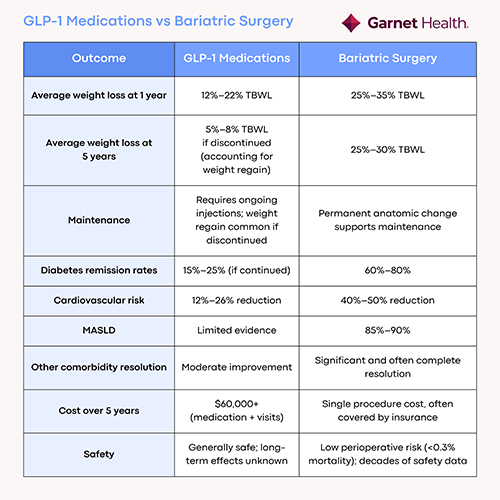Frequently Asked Questions: Bariatric Surgery
Want to know more about your bariatric surgery options? Speak with a Garnet Health weight loss expert by calling 845-333-2123.
Call: 845-333-2123
Who should consider bariatric surgery?
Bariatric surgery should be considered after conservative treatment of morbid obesity including diet, exercise, drugs and behavioral modification has failed. Surgery for morbid obesity is the only successful method of long-term weight reduction, as well as, significant improvement or complete resolution of co-morbidities (associated diseases – like Type 2 diabetes, sleep apnea, cardiovascular disease).
Patients seek out Garnet Health Medical Center’s Bariatric Surgery Center of Excellence Program after failing to lose weight through traditional means or when attempts at non-surgical treatment for morbid obesity have failed. Some have already begun researching the idea of bariatric surgery via the internet or other means, and others have heard from existing patients to attend one of our free informational seminars.
Am I a candidate for bariatric surgery?
At Garnet Health Medical Center, we follow the National Institutes of Health (NIH) guidelines and criteria for determining whether an individual is a candidate for Bariatric Surgery. Those guidelines indicate the following:
- Body Mass Index (BMI = weight divided by height in meters squared) of ≥40 (@ 100 pounds overweight), or ≥ 35 to 39.9 with at least one other obesity-related disease; i.e., Type 2 diabetes, sleep apnea, severe osteoarthritis, cardiac disease including high blood pressure and high cholesterol, polycystic ovary disease, etc. Those with a BMI ≥ 30-34.9 can be considered for a gastric Lap-Band ® only and must also have at least one other obesity-related disease to qualify for bariatric surgery.
- Must have tried and failed conservative treatment and be overweight for a minimum of 5 years.
- Must be 18 years of age or older.
- Must be mentally prepared for the procedure without having an eating disorder such as bulimia.
How successful is the surgery?
Results at Garnet Health Medical Center correspond to the national average. In the majority of cases, bariatric surgery patients lose anywhere from 45% to 83% of their excess body weight and improve or resolve 90% of their obesity-related health conditions within one year post-operatively.
Are there risks with weight loss surgery?
There is always a certain degree of risk involved with any surgery. At Garnet Health Medical Center, all bariatric surgeries are performed as minimally invasive, laparoscopic procedures, which decrease risks and complication rates. Laparoscopic gastric banding is ten times safer than gastric bypass, with a mortality rate of 0.09%. The laparoscopic sleeve gastrectomy mortality rate is also low at 0.05%.
What are the most common side effects?
Some of the more common side effects after bariatric surgery are:
- Fatigue
- Surgical pain (mild to moderate)
- Nausea
- Weakness
- Light-headedness
- Sleeplessness
- Loss of appetite
- Gas pain
- Constipation or loose stools
- Emotional ups and downs
- Dumping syndrome (sugar intolerance after gastric bypass)
What diet regimen is required before surgery?
Pre-operative diet is also important. It is strongly recommended and sometimes required by insurance companies that bariatric surgery candidates attempt to lose five percent body weight prior to surgery. This is recommended so the liver shrinks in size, making the surgery safer, and because research has shown better outcomes for patients who have already started to lose weight prior to surgery. Garnet Health Medical Center’s bariatric dietitian educators work closely with each bariatric surgery candidate to help to achieve this goal.
What diet regimen is required after surgery?
At Garnet Health Medical Center, all bariatric surgery patients are required to remain on bariatric clear liquids for a few days and then advance to a bariatric full-liquid diet, including protein shakes, for 2 weeks post-surgery. During week three, the diet varies depending on the procedure. Gastric Bypass and sleeve gastrectomy patients advance to a puree diet, and gastric band patients advance to soft solids. All patients eventually consume well-balanced and portion-controlled solid foods. The “slow, small, moist, and easy” eating techniques are critical for patients to follow:
- Set aside 30 minutes to consume each meal
- Chew food 28 to 30 times before swallowing
- Take small bites and use a saucer in place of a plate to aid in portion control
- Stop eating as soon as you feel full
- Eat all of your protein first to ensure adequate amounts before feeling full
- Stop drinking 30 minutes before eating; do not drink during your meal; wait 30 minutes after eating to resume drinking
Can a person still overeat?
Attempts to overeat immediately after surgery will cause the patient to regurgitate. Over time, with the gastric bypass and sleeve gastrectomy, the pouch will expand slightly and allow more food to be ingested at one time. As a result, patients must be educated pre-operatively about the difference in the rules of their stomach pouch to prevent weight regain. Moreover, it is very important that patients continue to attend support groups after surgery to learn behavior modification techniques necessary to prevent weight regain.
What kind of follow-up is there after surgery?
A follow-up is conducted at the surgeon’s office during the following intervals:
1 wk/1 mo/3 mo/6 mo/9 mo/1 yr and once per year for life. For gastric banding patients, add additional follow-ups for adjustments of the band, once every 6 weeks to 3 months within the first year.
Follow-up is also provided by the bariatric dietitian educator from Garnet Health Medical Center, as well as physical and behavioral health therapists and other physicians/ancillary staff representing the multidisciplinary approach to care at our bariatric support groups provided throughout the month.
Bariatric Surgery
Bariatric weight loss surgery provides an excellent, sometimes lifesaving, option for people who are severely obese and cannot lose weight by traditional means, as well as those who suffer from serious obesity-related health issues.
Learn MoreBariatric Medicine Providers
Related Bariatric News

December 2, 2025
Considerations for Having Plastic Surgery After Bariatric Surgery
For many people on the bariatric journey, weight loss is not just about the number on the scale—it’s ...

October 30, 2025
Staying on Track with Nutrition During the Holidays
A Guide for Bariatric Surgery Patients — Pre- and Post-OperativeThe holidays bring joy, family, and fes...

October 1, 2025
Exercise Basics - Before & After Bariatric Surgery
IntroductionWelcome to our support group blog! Whether you’re considering bariatric surgery, preparing ...

September 12, 2025
Bariatric Surgery vs. GLP-1 Drugs
Janet Klein, MS RDN, CDN, CDCES, Bariatric Surgery and Obesity Medicine Program DirectorIt may not be muc...
Upcoming Bariatric Events
Weight-loss
Bariatric Weight Loss Surgery Seminar
Tuesday, December 16, 2025
6:00 pm - 7:30 pm
Weight-loss
Bariatric Surgery Support Group
Tuesday, December 16, 2025
7:30 pm - 8:30 pm
Weight-loss
Bariatric Surgery Pre-Op Class
Thursday, December 18, 2025
1:00 pm - 3:00 pm
Weight-loss
Bariatric Weight Loss Surgery Seminar
Tuesday, January 6, 2026
6:00 pm - 7:30 pm
Weight-loss
Bariatric Surgery Support Group
Tuesday, January 6, 2026
7:30 pm - 8:30 pm
Weight-loss
Bariatric Surgery Pre-Op Class
Thursday, January 8, 2026
6:30 pm - 8:30 pm





